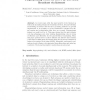Free Online Productivity Tools
i2Speak
i2Symbol
i2OCR
iTex2Img
iWeb2Print
iWeb2Shot
i2Type
iPdf2Split
iPdf2Merge
i2Bopomofo
i2Arabic
i2Style
i2Image
i2PDF
iLatex2Rtf
Sci2ools
106
click to vote
MCAM
2007
Springer
2007
Springer
Fingerprinting Codes for Live Pay-Television Broadcast Via Internet
In recent years, with the rapid growth of the Internet as well as the increasing demand for broadband services, live pay-television broadcasting via internet has become a promising business. To get this implemented, it is necessary to protect distributed contents from illegal copying and redistributing after they are accessed. Fingerprinting system is a useful tool for it. This paper shows that the anti-collusion code has advantages over other existing fingerprinting codes in terms of efficiency and effectivity for live pay-television broadcasting. Next, this paper presents how to achieve efficient and effective anti-collusion codes based on affine plane and unital, which are two known examples of balanced incomplete block design (BIBD). Meanwhile, performance evaluations of anti-collusion codes generated from affine plane and unital are conducted. Their practical explicit constructions are given last. Key words: fingerprinting code, anti-collusion code, BIBD, unital, affine plane
| Added | 08 Jun 2010 |
| Updated | 08 Jun 2010 |
| Type | Conference |
| Year | 2007 |
| Where | MCAM |
| Authors | Shuhui Hou, Tetsutaro Uehara, Yoshitaka Morimura, Michihiko Minoh |
Comments (0)

